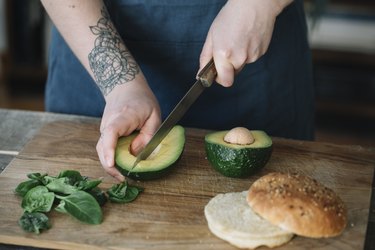
We've all opened our crisper drawers to find slimy spinach and mushy asparagus tops. And then tossed out sprouted potatoes, dried-up garlic and suspicious eggs.
About 40 percent of the food produced never makes it ways to our mouths. Instead, it finds its way to the landfill, according to the National Resources Defense Council.
Video of the Day
Video of the Day
That's bad for our wallets (it costs the average household $1,800 per year) and the environment — and not just because we're wasting resources like water and land, but because food waste is actually a significant contributor of greenhouse gases.
There are many ways to help cut back on food waste — enter: meal planning and understanding FIFO and expiration dates — but how we store our food plays a big role, too. Here are some tricks to help your go-to kitchen staples last a little longer.
1. Dairy
To prevent your cheddar from spiraling down the trash chute, keep all dairy in the coldest part of your fridge, which is typically towards the back. Refrain from storing in the refrigerator doors where warmer air has easier access, according to the Academy of Nutrition and Dietetics.
You'll want to wrap hard cheeses in parchment paper and then plastic wrap to extend their freshness. Soft cheeses typically don't last as long, such as cottage and ricotta, should be consumed within about a week after opening.
2. Berries
Refrigerate strawberries, blueberries, blackberries and raspberries unwashed and in their original containers. Just before eating, rinse them gently with cold water.
Berries range in their heartiness (how long they last in the fridge): blueberries last around 10 to 14 days; blackberries 3 to 6 days; raspberries about 2 days; strawberries up to 3 days, per the Produce for Better Health Foundation.
3. Tomatoes

Close the refrigerator door and slowly step away. You're ruining your tomatoes. Cold temperatures destroy their flavor and keep tomatoes from ripening to peak deliciousness.
The Florida Tomato Committee recommends placing them with the stem up on the counter at room temperature. If they're not ripe enough, they'll just need a day or two (no more than five) to turn a rich, ripe red.
4. Ginger Root
To minimize waste, buy only what you need (FYI: in most stores, it's fine to break off a piece).
Store ginger dry, unpeeled and tightly wrapped in plastic wrap or a paper towel for up two to three weeks in the refrigerator, according to Produce for Better Health Foundation. Wash and peel right before using it.
5. Avocado
Unripe, firm avocados will ripen on the counter at room temperature (it may take four to five days). But you can put them in the refrigerator to slow the ripening process, advises Avocados from Mexico.
If you've cut an unripe avocado, sprinkle the fruit with lime or lemon juice or coat lightly with vinegar and refrigerate in an airtight container, per the Peruvian Avocado Commission.
How to Freeze Avocados
Yes, you can freeze your ripe avo and save it for a later date. But it has to mashed first. First, wash the outside of the avocado thoroughly, and then cut it open lengthwise. Then, add the flesh to a blender with one tablespoon of lemon or lime juice per one avocado. Place it in an airtight container, where it can last up to five months, according to the Peruvian Avocado Commission.
6. Leafy Greens
A quick trick when buying already cut leafy greens in a plastic bag or container is to add a couple of pieces of paper towel to the container before refrigerating. This will help soak up any excess moisture.
Wash and dry the leaves thoroughly before using — they typically last for a few days to a week when refrigerated.
7. Nuts and Seeds
Nuts and seeds are naturally oily, which is great for their flavor and heart-health benefits, but bad for their longevity. Oil eventually turns rancid, and spoiled nuts and seeds take on a bitter, sharp and overall unpalatable flavor. Fortunately, cold temperatures can delay their demise.
Store nuts and seeds in an airtight container in the fridge.
8. Eggs
Similar to dairy, you want to keep raw eggs in the coldest part of the refrigerator, not in the door where temperature fluctuations can decrease their quality.
Keep them in their original packaging; refrain from storing them in the egg tray that may come with your refrigerator. Raw eggs can keep for three to five weeks in the refrigerator, according to the Academy of Nutrition and Dietetics.
9. Flours

Grain- and nut-based flours are more susceptible to oxidation than their more intact counterparts because there is more exposed surface area.
All-purpose flour, almond flour, flax meal and the like should be kept in an airtight container and stored in the freezer, ideally. The refrigerator will do, too, but the colder the better and the longer your flour will last.
10. Whole Grains
Whole grains, just like whole nuts and seeds, last longer than flours. It's still best to keep them in an airtight container and store at room temperature in your pantry (up to six months) or freeze them if you have the room and they'll last longer (up to a year), according to the Whole Grains Council.
11. Asparagus
Follow the 3 C's when it comes to storing asparagus: "clean, cold and covered," according to the Michigan Asparagus Advisory Board.
For best results, trim a quarter-inch from the stem, wash thoroughly, pat dry and store stems down in a jar filled with two inches of cold water. Enjoy within two to three days of storing.
12. Potatoes
Potatoes like it dark and cozy, so keep them in a perforated plastic or paper bag in a dark corner of the kitchen. Avoid temperature extremes. Heat (think: under the kitchen sink or in front of a window) encourages sprouting, while the cold refrigerator rapidly turns starches into sugar, resulting in a discolored, sweet-flavored spud. (That's not what you want.)
The storage space also needs to be well ventilated and they can keep for three weeks or longer, according to the Produce for Better Health Foundation.
13. Garlic
Keep garlic in a cool, dark area with good ventilation. A mesh bag or basket will do the trick.
The Herb Society of America advises against refrigeration, which can hasten mold. You can freeze garlic, either as whole cloves or pureed with a little water in ice trays.
14. Onions
The experts at the National Onion Association recommend storing whole onion bulbs in a cool, dry, dark place with good air circulation. In other words, don't keep onions in plastic bags, in front of a window or in the refrigerator.
Tip
Don’t store onions with potatoes or other produce that releases moisture. Once peeled, onions should be refrigerated.
15. Fresh Herbs
Keep basil, parsley, cilantro and dill springtime fresh. Like a bouquet of flowers, trim the stems and place the fresh herbs in a glass of water. Keep the water low enough so that the leaves don't touch. You can keep them on the counter or refrigerate for a longer shelf-life.
16. Olive Oil
Buy olive oil in dark glass bottles and store in a cool, dark place like a cabinet or pantry, recommends the California Olive Oil Council.
Don't put olive oil in the refrigerator — you'll risk condensation forming inside of the bottle that can change the flavor. And don't store it on the counter next to your stove... no matter how convenient that may be.
Olive oil is best used within 12 to 18 months of the harvest date and once it's opened, it's best used within six months.
- National Resources Defense Council: "Wasted: How America Is Losing Up to 40 Percent of Its Food from Farm to Fork to Landfill"
- California Olive Oil Council: "Tips for Cooking & Storage"
- Academy of Nutrition and Dietetics: "Keep Your Dairy and Egg Products Safe"
- Produce for Better Health Foundation: "Potato"
- Produce for Better Health: "Fruits & Veggies"
- Whole Grain Council: "Storing Whole Grains"
- Michigan Asparagus Advisory Board: "Frequently Asked Questions"
- Florida Tomato Committee: "Storage & Hints"
- Produce for Better Health: "Ginger Root"
- National Onion Association: "Storage and Handling"
- Hass Avocado Board: "Selecting and Storing"
- Herb Society of America: "Garlic"